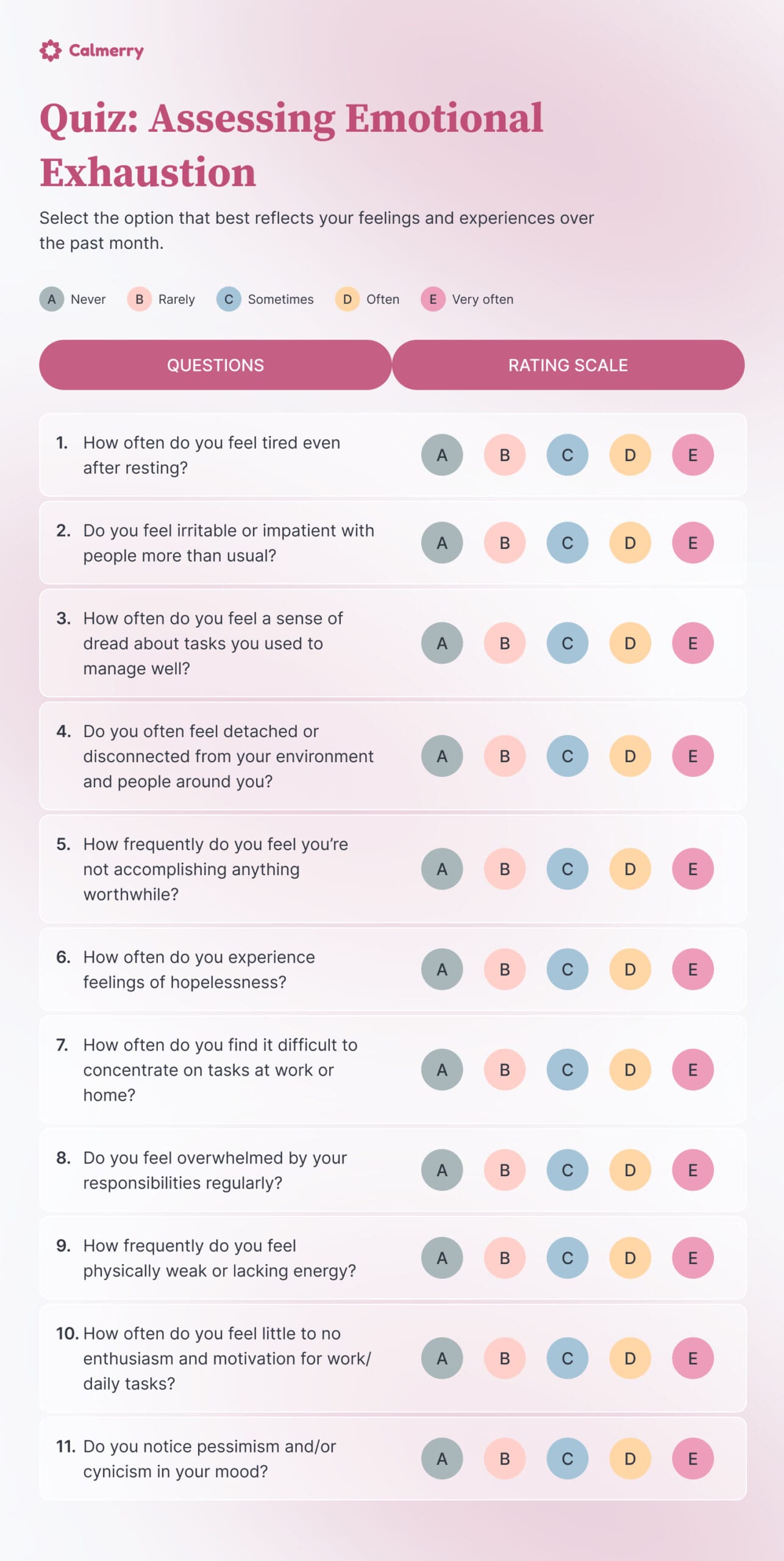Emotional Exhaustion Test in 3 Minutes

In this article
Feeling constantly tired, overwhelmed, and emotionally drained? Do you have difficulty coping with everyday tasks? Do you feel like you don’t have anything left to give others?
These can be some of the signs of emotional exhaustion. This state is often caused by prolonged stress, a traumatic event, or simply having too much on your plate.
We created the quiz to help you recognize the symptoms early to manage them effectively and restore your emotional and mental energy.
Who is this quiz for?
This quiz with 11 questions is for anyone feeling overwhelmed by daily stresses and responsibilities. It’s a tool to help you identify signs of emotional exhaustion and encourage you to take steps toward better emotional health.
Is this quiz accurate?
This quiz is designed to provide insights based on common symptoms of emotional exhaustion. [1] Sullivan, D., Sullivan, V., Weatherspoon, D., & Frazer, C. (2022). Comparison of nurse burnout, before and during the COVID-19 pandemic. the Nursing Clinics of North America/Nursing Clinics of North America, 57(1), 79–99. https://doi.org/10.1016/j.cnur.2021.11.006 It’s a useful tool for self-reflection but is not a substitute for professional diagnosis.
If you’re concerned about your mental health, discussing your results with a professional is a good idea.

Quiz: Assessing Emotional Exhaustion
Select the option that best reflects your feelings and experiences over the past month.
1) How often do you feel tired even after resting?
A. Never
B. Rarely
C. Sometimes
D. Often
E. Very often
2) Do you feel irritable or impatient with people more than usual?
A. Never
B. Rarely
C. Sometimes
D. Often
E. Very often
3) How often do you feel a sense of dread about tasks you used to manage well?
A. Never
B. Rarely
C. Sometimes
D. Often
E. Very often
4) Do you often feel detached or disconnected from your environment and people around you?
A. Never
B. Rarely
C. Sometimes
D. Often
E. Very often
5) How frequently do you feel you’re not accomplishing anything worthwhile?
A. Never
B. Rarely
C. Sometimes
D. Often
E. Very often
6) How often do you experience feelings of hopelessness?
A. Never
B. Rarely
C. Sometimes
D. Often
E. Very often
7) How often do you find it difficult to concentrate on tasks at work or home?
A. Never
B. Rarely
C. Sometimes
D. Often
E. Very often
8) Do you feel overwhelmed by your responsibilities regularly?
A. Never
B. Rarely
C. Sometimes
D. Often
E. Very often
9) How frequently do you feel physically weak or lacking energy?
A. Never
B. Rarely
C. Sometimes
D. Often
E. Very often
10) How often do you feel little to no enthusiasm and motivation for work/daily tasks?
A. Never
B. Rarely
C. Sometimes
D. Often
E. Very often
11) Do you notice pessimism and/or cynicism in your mood?
A. Never
B. Rarely
C. Sometimes
D. Often
E. Very often
How to understand your results
If you answered “Often” or “Very often” to many questions, it might indicate that you’re experiencing significant emotional exhaustion.
Seeking professional help and discussing these feelings with a therapist can provide you with strategies to manage stress and recharge your emotional state.
If most of your answers are “Never,” “Rarely,” or “Sometimes,” emotional exhaustion may not be a significant concern for you. But every experience matters. Maintaining good stress management techniques is always beneficial.
Next steps after the test
Coping with emotional exhaustion involves managing symptoms – but also building a more sustainable way of life.
- If your results suggest emotional exhaustion, consider reaching out for professional help. Therapy can be very effective in managing and overcoming emotional exhaustion.
- Develop a self-care routine with adequate rest, nutrition, physical activity, and relaxation.
- Set boundaries to ensure you’re not overwhelmed by demands from work or personal relationships.
How therapy can help with emotional exhaustion
Emotional exhaustion can feel like being stuck in a relentless cycle of stress and fatigue. Therapy offers a supportive environment where you can understand and manage these experiences effectively.
- Therapists provide expert insights into the psychological factors contributing to your emotional exhaustion. They can help you identify stress triggers and patterns of negative thinking that may be affecting your emotional health.
- Therapy can equip you with the right tools you need to manage your daily stressors more effectively.
- Regular sessions provide a safe space to express your feelings without judgment. Discussing your challenges openly can relieve the burden of carrying them alone and lead to insights and resolutions that are difficult to achieve without professional guidance.
- Therapy can help you rebuild resilience against stress. By enhancing your ability to bounce back from setbacks and building a more supportive lifestyle, you can protect yourself from future episodes of emotional exhaustion.
If you’re feeling emotionally exhausted, consider reaching out to our Calmerry therapists. They can help you to regain your energy and enthusiasm for life.
Start with a quick survey – and we will match you with them within 1 hour.
Sullivan, D., Sullivan, V., Weatherspoon, D., & Frazer, C. (2022). Comparison of nurse burnout, before and during the COVID-19 pandemic. the Nursing Clinics of North America/Nursing Clinics of North America, 57(1), 79–99. https://doi.org/10.1016/j.cnur.2021.11.006
online therapy
live video session



